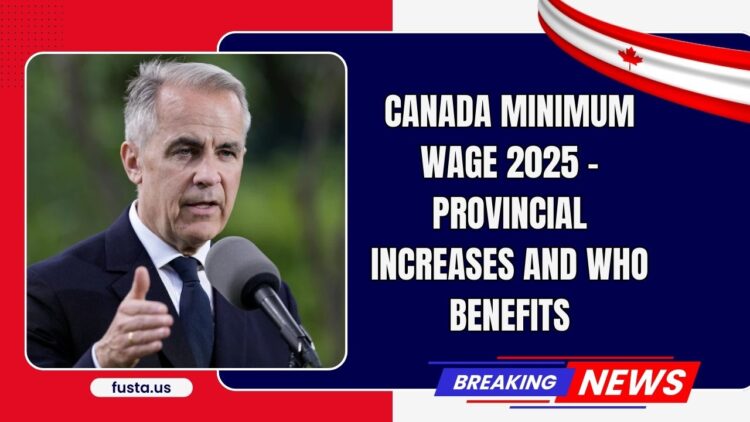With the cost of living rising steadily, Canadian provinces and territories are updating their minimum wage rates in 2025 to help workers maintain purchasing power.
These changes, driven by regional inflation and economic considerations, mean higher pay for thousands of hourly workers.
Here’s a comprehensive breakdown of the latest provincial increases, effective dates, and what they mean for employees and employers alike.
Federal vs. Provincial Minimum Wage
Canada doesn’t have a unified minimum wage. Instead:
- The federal minimum wage, applied to federally regulated sectors (banking, shipping, airlines), increased to $17.75/hour on April 1, 2025, reflecting recent cost of living adjustments.
- Workers are entitled to the higher of the federal or their province’s minimum wage, whichever is greater.
2025 Minimum Wage Update Overview
| Province/Territory | Old Rate | New Rate | Effective Date |
|---|---|---|---|
| British Columbia | $17.40 | $17.85 | June 1, 2025 |
| Quebec | $15.75 | $16.10 | May 1, 2025 |
| New Brunswick | — | $15.65 | April 1, 2025 |
| Newfoundland & Labrador | — | $16.00 | April 1, 2025 |
| Nova Scotia | — | $15.70 | April 1, 2025 |
| PEI | — | $16.00 | Oct 1, 2024 (in force) |
| Manitoba | — | $16.00 | Oct 1, 2025 (projected) |
| Ontario | — | $17.60 | Oct 1, 2025 (projected) |
| Saskatchewan | — | $15.35 | Oct 1, 2025 (projected) |
| NWT | — | $16.95 | Sep 1, 2025 (projected) |
| Nunavut | — | $19.75 | Sep 1, 2025 (projected) |
| Yukon | — | $17.94 | April 1, 2025 |
Some rates reflect current updates, while others are scheduled for later in the year.
Who Benefits from Higher Minimum Wages?
Workers
- More take-home pay, improved living standards
- Helps offset rising costs for rent, groceries, and essentials
- Encourages reduced reliance on credit
** Employers & Businesses**
- Higher labor costs, particularly impacting small businesses
- May lead to pricing, scheduling, or staffing adjustments
- Potential for better employee morale and reduced turnover
Economy
- Increased consumer spending can stimulate local economies
- Potential for slight inflationary pressure
- Contributes to lowering income inequality
Key Takeaways by Region
- British Columbia and Quebec saw early increases, leading the provinces in wages.
- Atlantic provinces like New Brunswick, Nova Scotia, and Newfoundland raised rates with April implementation.
- PEI, Manitoba, Ontario, Saskatchewan, NWT, and Nunavut have planned adjustments later in the year, ensuring continued gains.
- Yukon maintains one of the highest rates currently.
Canada’s 2025 minimum wage updates reflect a nationwide push to counter rising costs and support workers. With key increases already implemented and others scheduled throughout the year, workers across provinces stand to benefit from improved wages.
Staying informed about your local rate changes allows for better budgeting, workplace planning, and navigating employment negotiations.
FAQs
What if my province’s minimum wage is lower than the federal rate?
You’re still entitled to the higher wage, so your employer must pay you federal or provincial minimum, whichever is greater.
When will Ontario’s minimum wage increase take effect?
Ontario plans to raise its wage to $17.60/hour on October 1, 2025.
Do minimum wage increases affect overtime pay as well?
Overtime is calculated based on your regular hourly rate, so a higher minimum wage increases your overtime earnings proportionally.
